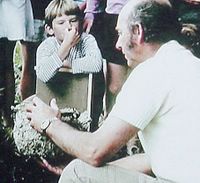
Unplanned curriculum

I am busy trying to put together ideas for a range of workshops that I am to present during the next week or so.
There is always the thought, ‘who am I to pass out advice to others about teaching and learning. It just can’t be my advanced age’. As some wit once said, ‘Age is compulsory – wisdom option!’
And who am I to criticize the expert ‘wisdom’ that comes from on high written in the style of those who know best?
The answer is that we all have in our heads a view of teaching and learning that we use whenever we work with individual students and, for better or worse, it affects the learning of the student. During individual learning incidents we have no time to rush to read the curriculum manuals.
So it is important to clarify what you believe about teaching and learning. This is best done by, reflecting on each teaching moment, by talking with and observing others, and reading whatever you can. From such experiences we build up a comprehensive approach, to which is added, the courage absorbed informally from others you respect who believe in similar things.
If we don’t , with all the imposed pressures and expectation, plus accountability requirements, it is all to easy to throw in the towel and take the easy way out; to do what others expect of you. But this is not the easy way out at all as you find yourself rushing through things to cover what all the distant experts want. The sheer quantity makes us exhausted. Trying to do all this only results in stress and ‘burnout’ and feeling that something has been lost. Merely repeating approved orthodoxy is not living creativity; imagination and spirit are missing.
What is lost is ourselves; what we bring to each teaching situation. We lose what I like to call the ‘artistry of teaching’ because true teaching is an art – and not just mixing and applying a range of store bought colours. Art is about passion not technique – although both are necessary. Artists are not comfortable with uniformity and formula driven 'best' practices.
So, like an artist, you need a unifying vision to decide which action is significant. An artist knows intuitively what to select and how to respond when things don’t quite turn out right. An ‘artist’ teacher is always asking, ‘what can I do to help this learner next?’
The answers come to us distilled from all the learning conversation you have ever had. And from what you have learnt from the countless prior teaching incidents you have experienced.
It is these ideas I want to share at my workshops.
Trust yourself and keep learning.
No one forgets a ‘magic’ teacher!
It is a shame that we even need to fight for, or reclaim, the notion of the creative teacher
5 comments:
I think you are right when you say teachers have been burdened with so many imposed ideas and accountability demands that many are simply 'burntout' and just survive by doing what they are told to do.
That a number of principals and teachers seem to be stressed, by not quite knowing what the Ministry wants of them, reminds me of a R.D. Laing's 1970 poem.
Knots
There is something I don't know
That I am supposed to know,
I don't know what it is I don't know.
And feel I look stupid
If I seem both not to know it
And not know what it is I don't know.
Therefore , I pretend to know it.
This is nerve wracking since I don't know what I pretend to know
Therefore, I pretend I know everything.
If making meaning, and feeling in control, is vital to an individual's mental health, then feeling in a 'knot' is a real problem. It causes, what one writer calls, 'a corrosion of character.'
R.D.Laing's poem is just too true!
Facing up to the reality that admitting that what they are being asked to do is just political nonsense is just too hard for most principals! Easier to pretend and hope ERO don't notice.
Since you like quotes Bruce here is one for you:
'People can't stand too much reality'. Carl Jung
Great stuff - brightened my day!
Great, insightful observations as usual. I think you are so right.
The most common missing ingredients in teaching and learning seems to be initiative and originality or as you put it 'imagination and spirit' We need to refocus on the art of teaching.
Post a Comment